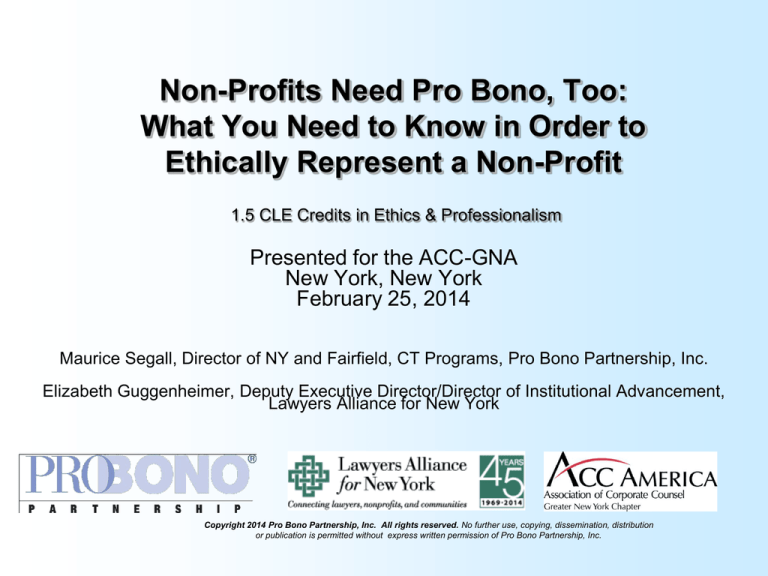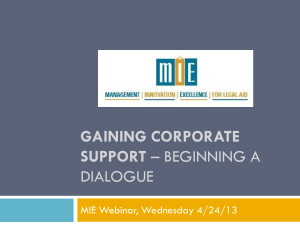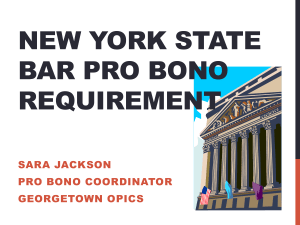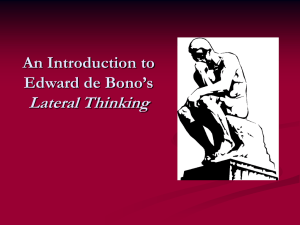
Non-Profits Need Pro Bono, Too:
What You Need to Know in Order to
Ethically Represent a Non-Profit
1.5 CLE Credits in Ethics & Professionalism
Presented for the ACC-GNA
New York, New York
February 25, 2014
Maurice Segall, Director of NY and Fairfield, CT Programs, Pro Bono Partnership, Inc.
Elizabeth Guggenheimer, Deputy Executive Director/Director of Institutional Advancement,
Lawyers Alliance for New York
Copyright 2014 Pro Bono Partnership, Inc. All rights reserved. No further use, copying, dissemination, distribution
or publication is permitted without express written permission of Pro Bono Partnership, Inc.
2
About Pro Bono Partnership
Coordination and resource center dedicated to supporting in-house and
private corporate lawyers engaging in pro bono activities.
Our clients are nonprofit organizations (not individuals) throughout NY
(excluding NYC), NJ and CT.
To be eligible, the organization must be:
Nonprofit and tax-exempt (or seeking assistance to obtain this
status);
Serve the poor, disadvantaged, or enhance the community through
arts, education, or environmental work;
Offer programs that have a discernable impact on the community;
and
Be unable to pay for legal services without significant impairment of
program resources.
Visit our website at www.probonopartner.org or call us at (914) 328-0674
Copyright 2014 Pro Bono Partnership, Inc. All rights reserved. No further use, copying, dissemination, distribution
or publication is permitted without express written permission of Pro Bono Partnership, Inc.
3
About Lawyers Alliance for New York
Founded in 1969 as the Council of New York Law Associates, Lawyers
Alliance continues to reflect its founders' vision: that lawyers can and should
be a vital force for change
Lawyers Alliance mobilizes talented business and transactional lawyers from
every discipline to help make New York City a better place to live and work.
More than 1400 attorneys from corporations and law firms volunteer each year
Clients are nonprofit organizations that are improving quality of life in New
York City neighborhoods. They are engaged in affordable housing, economic
development, children and youth services, community arts, urban health, and
other vital programs to benefit low-income New Yorkers
Lawyers Alliance’s staff-supported pro bono program provides nonprofits with
legal guidance on corporate, tax, real estate, employment, intellectual
property, regulatory, and other operational and organizational issues
Visit our website at www.lawyersalliance.org or call us at 212-219-1800
Copyright 2014 Pro Bono Partnership. All rights reserved. No further use, copying, dissemination, distribution
or publication is permitted without express written permission of Pro Bono Partnership.
4
Introduction
This presentation is designed to address possible ethical
issues attorneys face when providing pro bono representation
to a nonprofit organization.
The same ethical rules apply to representing a pro bono client
as a paying client.
NY Rules of Professional Conduct (the “Rules”) guide ethical
issues:
– The Rules set minimum standards of conduct.
– As of 4/1/09 the Rules replaced the prior old Disciplinary
Rules.
– The Rules follow the ABA Model Rules format/numbering
system.
Copyright 2014 Pro Bono Partnership, Inc. All rights reserved. No further use, copying, dissemination, distribution
or publication is permitted without express written permission of Pro Bono Partnership, Inc.
5
Part I:
Pro Bono Representation
Copyright 2014 Pro Bono Partnership, Inc. All rights reserved. No further use, copying, dissemination, distribution
or publication is permitted without express written permission of Pro Bono Partnership, Inc.
6
Pro Bono Representation
Lawyers have a duty to promote access to the legal system
and administration of justice. (Rules Preamble)
Lawyers should aspire to provide at least 20 hours of pro bono
legal services yearly. (Rule 6.1(a)(1))
Lawyers are strongly encouraged to provide pro bono legal
services to benefit poor persons.
– Includes pro bono assistance to charitable organizations
serving the poor (Rule 6.1(b)(3))
Lawyers/firms should also provide financial support to
organizations that provide legal services to the poor. (Rule
6.1(a)(2))
Copyright 2014 Pro Bono Partnership, Inc. All rights reserved. No further use, copying, dissemination, distribution
or publication is permitted without express written permission of Pro Bono Partnership, Inc.
7
Pro Bono Representation
NY-admitted attorneys can receive CLE credits for pro bono
work performed through an accredited CLE provider.
Pro Bono Partnership and Lawyers Alliance are accredited
CLE providers for provision of pro bono CLE credits; see
www.probonopartner.org or www.lawyersalliance.org for more
information.
For more information, visit:
http://www.nycourts.gov/attorneys/cle/
Copyright 2014 Pro Bono Partnership, Inc. All rights reserved. No further use, copying, dissemination, distribution
or publication is permitted without express written permission of Pro Bono Partnership, Inc.
8
Pro Bono Representation
As of December 4, 2013, attorneys registered as authorized inhouse counsel in New York are able to provide pro bono
services, provided they are admitted in another state or the
District of Columbia and they are in good standing.
See Amendment to Part 522 of the Rules of the Court of
Appeals.
Copyright 2014 Pro Bono Partnership. All rights reserved. No further use, copying, dissemination, distribution
or publication is permitted without express written permission of Pro Bono Partnership.
9
Part II:
The Board as the Client
Copyright 2014 Pro Bono Partnership. All rights reserved. No further use, copying, dissemination, distribution
or publication is permitted without express written permission of Pro Bono Partnership.
10
The Board as the Client
The lawyer owes a duty to the corporation, not to individuals
associated with it or employed by it. (Rule 1.13)
When a lawyer represents a nonprofit corporation, the board of
directors is the client, not the Executive Director (ED) or other
staff. The lawyer should clarify this with Board and the ED.
Board members should sign the engagement or retention
letter.
Copyright 2014 Pro Bono Partnership, Inc. All rights reserved. No further use, copying, dissemination, distribution
or publication is permitted without express written permission of Pro Bono Partnership, Inc.
11
Overview of Nonprofit Organizations
Members
(sometimes)
Board of Directors
Executive Director
Remaining staff
Copyright 2014 Pro Bono Partnership, Inc. All rights reserved. No further use, copying, dissemination, distribution
or publication is permitted without express written permission of Pro Bono Partnership, Inc.
12
The Board as the Client
Actions Taken Against the Best Interests of the Corporation (Rule
1.13(b))
If the lawyer knows that an individual associated with the organization is
engaged in action, intends to act, or refuses to act in a manner that is (i) a
violation of a legal obligation to the organization or a violation of law that
reasonably might be imputed to the organization, and (ii) is likely to result in
substantial injury to the organization, then the lawyer shall proceed as is
reasonably necessary in the best interests of the corporation.
The lawyer shall consider:
– The seriousness of the violation and its consequences;
– The scope and nature of the lawyer’s representation;
– The responsibility in the organization and the apparent motivation of the
person involved;
– The policies of the organization concerning such matters;
– Any other relevant considerations.
Copyright 2014 Pro Bono Partnership, Inc. All rights reserved. No further use, copying, dissemination, distribution
or publication is permitted without express written permission of Pro Bono Partnership, Inc.
13
The Board as the Client
Actions Taken Against the Best Interests of the Corporation (cont’d)
Measures taken shall be designed to minimize disruption to the
organization and the risk of revealing information to people outside
the organization.
Measures taken by the lawyer may include:
– Asking for reconsideration of the matter;
– Advising that a separate legal opinion on the matter be sought to
present the appropriate authority in the organization;
– Referring the matter to a higher authority in the organization,
including referral to the highest authority that can act on behalf of
the organization (if warranted by the seriousness of the matter).
Copyright 2014 Pro Bono Partnership, Inc. All rights reserved. No further use, copying, dissemination, distribution
or publication is permitted without express written permission of Pro Bono Partnership, Inc.
14
The Board as the Client
How do you know if an action (or inaction) is in the “best interest of the
organization”?
Rule 1.13, comment 3 - when the Board of Directors makes decisions
for the nonprofit, the decisions ordinarily must be accepted by the
lawyer, even if their utility or prudence is doubtful. Decisions
concerning policy and operations, including ones entailing serious
risk, are not within the lawyer’s province.
However, if the lawyer knows that the organization is likely to be
substantially injured by action of an officer or other constituent that
violates a legal obligation to the organization or is in violation of the
law that might be imputed to the organization, the lawyer must
proceed as is reasonably necessary in the best interest of the
organization.
Rule 1.0(k) - the lawyer’s knowledge can be inferred from
circumstance, and the lawyer cannot ignore the obvious.
Copyright 2014 Pro Bono Partnership, Inc. All rights reserved. No further use, copying, dissemination, distribution
or publication is permitted without express written permission of Pro Bono Partnership, Inc.
15
The Board as the Client
Board Disputes
If the board is divided or is involved in a fight over control, the lawyer
for the corporation may be disqualified from further representing the
corporation. (See Schmidt v. Magnetic Head Corp., 101 A.D.2d 268
(2d Dept.1984)
The lawyer may withdraw representation if there is a significant board
dispute.
– Rule 1.13(c)- if, despite the lawyer’s efforts, the highest authority that can
act on behalf of the organization insists upon action, or a refusal to act,
that is clearly in violation of the law and is likely to result in a substantial
injury to the organization, the lawyer may withdraw.
– Rule 1.16(c)(7) - lawyer may withdraw if the client fails to cooperate in the
representation or otherwise renders the representation unreasonably
difficult for the lawyer to carry out representation effectively.
Copyright 2014 Pro Bono Partnership, Inc. All rights reserved. No further use, copying, dissemination, distribution
or publication is permitted without express written permission of Pro Bono Partnership, Inc.
Part III:
Withdrawing Representation
Copyright 2014 Pro Bono Partnership, Inc. All rights reserved. No further use, copying, dissemination, distribution
or publication is permitted without express written permission of Pro Bono Partnership, Inc.
17
Withdrawing Representation
The rules that apply to withdrawing from representation of a
paying client also apply to pro bono representation.
Rule 1.16(b) - governs when a lawyer must withdraw from
representing a client (mandatory withdrawal).
Rule 1.16(c) - governs when a lawyer may withdraw from
representing a client (permissive withdrawal).
Copyright 2014 Pro Bono Partnership, Inc. All rights reserved. No further use, copying, dissemination, distribution
or publication is permitted without express written permission of Pro Bono Partnership, Inc.
18
Withdrawing Representation
Rule 1.16(b) – Mandatory Withdrawal when:
The lawyer knows/reasonably should know that the
representation will result in a violation of these Rules or other
law; or
The lawyer’s physical or mental condition materially impairs
his/her ability to represent the client; or
The lawyer is discharged; or
The lawyer knows/ reasonably should know that the client is
bringing the legal action, conducting the defense, or asserting
a position in the matter, or is otherwise having steps taken,
merely for the purpose of harassing or maliciously injuring any
person.
Copyright 2014 Pro Bono Partnership, Inc. All rights reserved. No further use, copying, dissemination, distribution
or publication is permitted without express written permission of Pro Bono Partnership, Inc.
19
Withdrawing Representation
Rule 1.16(c) – Optional Withdrawal when:
Withdrawal can be accomplished without material adverse effect on
the interests of the client;
The client persists in a course of action involving the lawyer’s
services that the lawyer reasonably believes is criminal or fraudulent;
The client has used the lawyer’s services to perpetrate a crime or
fraud;
The client insists upon taking action with which the lawyer has a
fundamental disagreement;
The client deliberately disregards an agreement or obligation to the
lawyer as to expenses or fees;
The client insists upon presenting a claim or defense that is not
warranted under existing law, and cannot be supported by good faith
argument for an extension, modification, or reversal of existing law;
Copyright 2014 Pro Bono Partnership, Inc. All rights reserved. No further use, copying, dissemination, distribution
or publication is permitted without express written permission of Pro Bono Partnership, Inc.
20
Withdrawing Representation
Rule 1.16(c) –Optional Withdrawal (cont’d)
The client fails to cooperate in the representation or otherwise
renders the representation unreasonably difficult for the lawyer to
carry out employment effectively;
The lawyer’s inability to work with co-counsel indicate that the
best interest of the client likely will be served by withdrawal;
The lawyer’s mental or physical condition renders it difficult for the
lawyer to carry out the representation effectively;
The client knowingly and freely assents to termination of the
employment;
Withdrawal is permitted under Rule 1.13(c) or other law;
The lawyer believes in good faith, in a matter pending before a
tribunal, that the tribunal will find the existence of other good
cause for withdrawal;
The client insists that the lawyer pursue a course of conduct
which is illegal or prohibited under these Rules.
Copyright 2014 Pro Bono Partnership, Inc. All rights reserved. No further use, copying, dissemination, distribution
or publication is permitted without express written permission of Pro Bono Partnership, Inc.
Part IV:
Limited Pro Bono Representation
Copyright 2014 Pro Bono Partnership, Inc. All rights reserved. No further use, copying, dissemination, distribution
or publication is permitted without express written permission of Pro Bono Partnership, Inc.
22
Limited Pro Bono Representation
Rule 6.5 addresses lawyers’ participation in shortterm pro bono legal services programs.
– “Short term legal services” are services providing legal
advice or representation free of charge as part of a
program with no expectation that the assistance will
continue beyond what is necessary to complete an initial
consultation, representation, or court appearance.
Copyright 2014 Pro Bono Partnership, Inc. All rights reserved. No further use, copying, dissemination, distribution
or publication is permitted without express written permission of Pro Bono Partnership, Inc.
23
Limited Pro Bono Representation
Rule 6.5
Lawyers that participate in short-term/limited scope programs
organized by the Court, government, bar association or nonprofit
legal services organizations must comply with certain Rules only
in specific circumstances:
– Because a lawyer who is representing a client under limited
circumstances is not able to systematically check for conflicts of
interest, lawyers shall comply with Rules 1.7, 1.8 and 1.9 (conflict of
interest: current clients and former clients) only if the lawyer has
actual knowledge at the time of commencement of the
representation that the representation of the client involves a
conflict of interest.
– Lawyers shall comply with Rule 1.10 (imputation of conflicts of
interest) only if the lawyer has actual knowledge at the time of
commencement of representation that another lawyer associated
with the lawyer in a law firm is affected by Rules 1.7, 1.8 or 1.9.
Copyright 2014 Pro Bono Partnership, Inc. All rights reserved. No further use, copying, dissemination, distribution
or publication is permitted without express written permission of Pro Bono Partnership, Inc.
24
Limited Pro Bono Representation
Lawyers providing short term limited legal services must
secure the client’s informed consent to the limited scope of the
representation.
– Pro Bono Partnership and Lawyers Alliance addresses this in its
client engagement letters and during initial call/meeting with the
nonprofit client and the volunteer attorney.
The representation is subject to Rule 1.6 governing
confidentiality.
Copyright 2014 Pro Bono Partnership, Inc. All rights reserved. No further use, copying, dissemination, distribution
or publication is permitted without express written permission of Pro Bono Partnership, Inc.
Part V:
Lawyer as Board Member
and Counsel
Copyright 2014 Pro Bono Partnership, Inc. All rights reserved. No further use, copying, dissemination, distribution
or publication is permitted without express written permission of Pro Bono Partnership, Inc.
26
Lawyer as Board Member and Counsel
Lawyers who serve on nonprofit boards are often asked to give legal advice to
the corporation.
– Not ethically prohibited, but there are arguments for and against serving in a
dual role.
– Legal issue often arise that are outside of the attorney/board members’ area(s)
of expertise.
– Rule 1.7, comment 35 - a lawyer for a corporation who is also a member of its
board should determine whether the responsibilities of the two roles may
conflict.
– Consideration should be given to:
the frequency with which such situations may arise;
the potential intensity of the conflict;
the effect of the lawyer’s resignation from the board;
the possibility of the corporation’s obtaining legal advice from another lawyer in
such situations.
Copyright 2014 Pro Bono Partnership, Inc. All rights reserved. No further use, copying, dissemination, distribution
or publication is permitted without express written permission of Pro Bono Partnership, Inc.
27
Lawyer as Board Member and Counsel
Directors have fiduciary duties to the corporation.
Duty of care - reasonable person standard
Attorneys serving on a nonprofit board should expect to be held to a
higher standard of care when legal matters within his/her area of
expertise arise in governance of the corporation, even if the
corporation is not the attorney’s client; can’t simply “check your legal
expertise at the door.”
Duty of loyalty
Watch out for conflicts of interest, particularly if the corporation
becomes a paying client of your firm.
Duty of obedience
Is the corporation fulfilling its stated purpose? Are restricted funds
used as required? (Note that unlike for-profits, most nonprofits have
detailed mission statements that narrowly prescribe the activities of
the corporation.)
Copyright 2014 Pro Bono Partnership, Inc. All rights reserved. No further use, copying, dissemination, distribution
or publication is permitted without express written permission of Pro Bono Partnership, Inc.
28
Lawyer as Board Member and Counsel
Serving on a board and serving as pro bono counsel can raise
various ethical issues regarding:
– Professional judgment
– Conflicts of interest
– Attorney-client privilege
The lawyer must always make clear in which capacity he/she
is acting.
Copyright 2014 Pro Bono Partnership, Inc. All rights reserved. No further use, copying, dissemination, distribution
or publication is permitted without express written permission of Pro Bono Partnership, Inc.
29
Lawyer as Board Member and Counsel
Professional Judgment
If the lawyer is pro bono counsel to the corporation, he/she
cannot:
– Use the position of director as a feeder for his/her private
practice. (Opinion No. 589, N.Y.S. Bar Assoc. Comm. On
Prof. Eth. (Mar. 18, 1988)
– Represent the corporation in any action in which he/she
has a personal proprietary interest.
Example: In re Edel 182 Misc.2d 878 (Surr. Ct. 1999).
Lawyer may have acted improperly in probating a will giving a
large gift to a charitable institution when the lawyer served as
a director for the institution and the institution used the
lawyer’s firm for legal services.
Copyright 2014 Pro Bono Partnership, Inc. All rights reserved. No further use, copying, dissemination, distribution
or publication is permitted without express written permission of Pro Bono Partnership, Inc.
30
Lawyer as Board Member and Counsel
Conflict of Interest
Rule 1.7, Comment 35: “If there is material risk that the dual
role [of counsel and board member] will compromise the
lawyer's independence of professional judgment, the lawyer
should not serve as a director or should cease to act as the
corporation's lawyer when conflicts of interest arise. The
lawyer should advise the other members of the board that in
some circumstances matters discussed at board meetings
while the lawyer is present in the capacity of director might not
be protected by the attorney-client privilege and that conflict of
interest considerations might require the lawyer's refusal as a
director or might require the lawyer and the lawyer's firm to
decline representation of the corporation in a matter.”
Copyright 2014 Pro Bono Partnership, Inc. All rights reserved. No further use, copying, dissemination, distribution
or publication is permitted without express written permission of Pro Bono Partnership, Inc.
31
Lawyer as Board Member and Counsel
Conflict of Interest (cont’d)
ABA Formal Ethics Opinion 98-410 identifies four possible conflict
situations:
1) Lawyer asked to pursue objectives of the organization
that as a director she opposed;
2) Lawyer asked to opine on board actions in which the
lawyer participated;
3) Board takes action affecting the lawyer’s firm (such as
whether to retain the firm);
4) Lawyer is representing an organization in which both the
organization and board members are parties
• Independent representation for directors when
controversy between organization and lawyers.
Copyright 2014 Pro Bono Partnership, Inc. All rights reserved. No further use, copying, dissemination, distribution
or publication is permitted without express written permission of Pro Bono Partnership, Inc.
32
Lawyer as Board Member and Counsel
Attorney-Client Privilege
Issue for attorneys serving on a board of directors - determining when
s/he crosses the line from acting as a director and offering business
advice, to providing legal services to the corporation, which
establishes the attorney-client relationship and attendant duties.
The attorney must exercise reasonable care to protect the attorneyclient privilege and related privileges.
Lawyers are required to disclose to the board that serving as a
director as well as attorney for a corporation can jeopardize the
attorney-client privilege. (Opinion No. 589, N.Y.S. Bar Assoc. Comm.
On Prof. Eth. (3/18/88))
Copyright 2014 Pro Bono Partnership, Inc. All rights reserved. No further use, copying, dissemination, distribution
or publication is permitted without express written permission of Pro Bono Partnership, Inc.
33
Lawyer as Board Member and Counsel
Attorney – Client Privilege (cont’d)
The lawyer needs to warn of the potential loss of privilege
when the lawyer is on the board.
– When the lawyer speaks to the board as counsel, s/he
should communicate that fact, and remind the board of
methods of preserving the attorney-client privilege.
– When the lawyer speaks to the board as director, s/he
should communicate that to the board.
– These communications should be noted in the minutes.
Copyright 2014 Pro Bono Partnership, Inc. All rights reserved. No further use, copying, dissemination, distribution
or publication is permitted without express written permission of Pro Bono Partnership, Inc.
34
Lawyer as Board Member and Counsel
Protection from Liability: Insurance Issues for the
Lawyer/Director
D&O insurance can provide protection for board members, including
the lawyer/director.
– Policies are often limited to claims arising solely out of service as
an officer or director.
Professional liability coverage can provide protection for
lawyer/director acting in role as lawyer.
– Generally does not cover claims arising out of a lawyer’s service
as a director.
Note: Each carrier may claim that coverage does not apply if role of
lawyer/director unclear.
Copyright 2014 Pro Bono Partnership, Inc. All rights reserved. No further use, copying, dissemination, distribution
or publication is permitted without express written permission of Pro Bono Partnership, Inc.
35
Lawyer as Board Member and Counsel
Best Practices to Minimize Risk for the Lawyer/Director
Set clear expectations of both the lawyer/director and the
corporation regarding legal representation.
Confirm that the corporation’s governing documents address
issues of liability, indemnification and conflict of interest.
Confirm that the corporation has the appropriate directors &
officers insurance coverage.
Confirm Lawyer’s professional liability coverage.
Copyright 2014 Pro Bono Partnership, Inc. All rights reserved. No further use, copying, dissemination, distribution
or publication is permitted without express written permission of Pro Bono Partnership, Inc.
36
IRS Circular 230 Disclosure: To ensure compliance with
requirements imposed by the IRS, we inform you that any tax
advice contained in this communication (including any
attachments) is not intended or written to be used, and cannot
be used, for the purpose of (i) avoiding penalties under the
Internal Revenue Code or (ii) promoting, marketing, or
recommending to another party any transaction or matter
addressed herein.
This presentation is provided by Pro Bono Partnership, Inc.
and Lawyer’s Alliance of New York as general information. It
should not be construed as, and does not constitute, legal
advice on any specific matter, nor does this presentation
create an attorney-client relationship. You should seek advice
based on your particular circumstances from an independent
legal advisor.
Copyright 2014 Pro Bono Partnership, Inc. All rights reserved. No further use, copying, dissemination, distribution
or publication is permitted without express written permission of Pro Bono Partnership, Inc.







